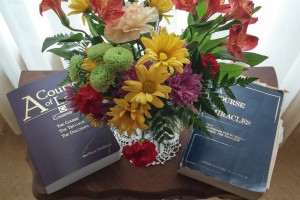 Help is here. Be what you have been called to be. Open your dwelling place to your true Self, your true identity. Imagine this opening and this replacement occurring with every fiber of your being. Imagine the separate self being enfolded, embraced, and finally consumed—taken into the Self of union. The body of Christ becomes real through this indwelling of Christ in form. D:1.11
Help is here. Be what you have been called to be. Open your dwelling place to your true Self, your true identity. Imagine this opening and this replacement occurring with every fiber of your being. Imagine the separate self being enfolded, embraced, and finally consumed—taken into the Self of union. The body of Christ becomes real through this indwelling of Christ in form. D:1.11
Some weeks ago, I went looking for a little booklet I’d put together somewhere around 2003, a booklet called “Movement within the Course of Love Series.” As I was searching my “writing closet,” I found a piece that I’d forgotten even having written. It was a longish exploration of the “identity crisis.” I wrote about my own identity crisis in 2002 and then wrote more in 2005, looking back on what I’d gone through. This reading stayed with me, sort of niggling in the background.
Then suddenly it is Sunday morning and I’m reading the St. Paul Pioneer Press where I find Garrison Keillor on the front page of the local section due to having just hosted his final segment of ‘A Prairie Home Companion.’ Many of his guests were making return appearances and a musical ode commemorated deceased members of the show’s extended family of artists—diverse artists who were “saying a sort-of farewell to a place they’d called home since the 1970s. For two hours of live radio, Keillor presided over a show that featured equal measures of gratitude, nostalgia and benediction.”
It called me back to the idea of identity crisis as a time of endings and new beginnings.
We read of our identity crisis first in the Prelude to ACOL. There we hear of those who, through A Course in Miracles, weakened their egos, walked this world with the hope of leaving ego behind and, with miracle-minded intent, “ushered in a time of ending our identity crisis.
Not since Jesus walked the earth has such a time been upon humankind.” P.5
What gratitude I feel for ACIM and all those who, with egos weakened, led to this new time. And to Jesus who says that this time, in ACOL, we will go the rest of the way. We will identify ourselves newly. He speaks of this from the very beginning, and in Day 1 of our Forty Days on the mountain, we hear that we are newly identified.
We go beyond what can be symbolized to what can only be known within. It is to this state of grace that I call you now, today: The state of grace of the newly identified child of God. Open your heart, for the one who dwells there in union with all will emerge from this opening. What was once a tiny pinprick of light becomes a beacon as you open your heart and allow your true identity to be what is, even within your form. You are in grace and union with the Source and Cause of unity. Be no longer causeless. You and your Source are one. D:1.12-13
But we also hear of a transition we have felt ourselves to be in:
So what is it that we will now do? If I do not teach, and you do not learn, what is our continuing means for completing this transformation? As you have been shown, this will not occur by means of preparation but by means of acceptance. This will not occur by means of trying but by means of surrender. D:1.18
 There is then a long discussion on being prepared, and how we have to quit preparing. I’ve been having people tell me I needn’t prepare for my upcoming presentation at the Course in Miracles conference, a conference whose venue is quite specific and whose significance I feel deeply. Jesus specifically linked A Course of Love to A Course in Miracles. It was clearly purposeful. And now here we stand, in many ways at the end of an era, and the beginning of a new one. Fifteen years post its earliest publication, ACOL is being welcomed and accepted. We stand at a new beginning. And so I am preparing.
There is then a long discussion on being prepared, and how we have to quit preparing. I’ve been having people tell me I needn’t prepare for my upcoming presentation at the Course in Miracles conference, a conference whose venue is quite specific and whose significance I feel deeply. Jesus specifically linked A Course of Love to A Course in Miracles. It was clearly purposeful. And now here we stand, in many ways at the end of an era, and the beginning of a new one. Fifteen years post its earliest publication, ACOL is being welcomed and accepted. We stand at a new beginning. And so I am preparing.
But I am not preparing from a place where I was ten or 15 years ago when this was true for me:
Realize that all of your “concerns” are still for the personal self, a self whom you continue to believe can fail to fulfill or live your mission and your purpose. You “see” this failure occurring through ineptness of speech, through inappropriateness of attire, through lack of physical stamina, through lack of intelligence—through lack, in other words, of abilities of the personal self.” D:1.3
That could have for sure been a description of me at the time and for some years to come. And that is okay. I just need to say this. We do go through great movement in this course. We change, internally and externally. But the whole way along we are the beloved. We do the best we can at the time, and we are held and nurtured until such time as we come into our time of fullness. It’s why, I believe, so many reminders and cautions and repetitions occur throughout the course. Jesus doesn’t actually expect us to instantly change—at least not outwardly. This merging of the human and divine is a process, a route, a way. And the only thing we’re asked to do along the way is to accept ourselves.
Where I am now is accepting myself. When I heard Jesus speaking directly to my heart through my inner ear I was not called to verbalize this on the spot as some have done. Jesus came to me to put what he was saying in writing, and this is still my way. It is a creative way, and I love it. Like all those artists who participated in the farewell to ‘A Prairie Home Companion,’ I spend time in the quiet creating what I will bring into that moment of sharing with a particular people in a particular time. All that I have been and have become, all of who I am, is there in the act of creation that I am held within, only to bring it forth into a new form. As I do this, I am surrendered to the process. I do not work alone. I am guided by feelings, by new insights, by newspaper articles, by friends, by being in dialogue. More clarity arises, more ideas come, more sorting and culling happens. It is lovely.
And then when we gather, many, many will be at work in union and relationship, making that gathering too, a new creation.
So I’m just saying, none of us need to discount our way as we embrace the way of this Course. Jesus isn’t calling us to abandon ourselves, but to accept ourselves and to have the courage to be fully ourselves. Let’s not have unrealistic expectations of ourselves or others, because we are being our human selves as well as our divine selves now. We are called to accept our differences. We are called not to presume that the graces that come to us will gift us all in the same way, but to find the way that is uniquely ours.
In ACOL we move to a way of dialogue and we will, as an ACOL community, gather in dialogue, in casual and spontaneous ways—following the conference. And for 75 minutes, sometime before that, I will share what I’ve created in unity and relationship on being “All that we are” and how that will change the world.
We work together in love and unity for what can only be received in the love and unity in which we truly exist together, as one body, one Christ, one Self .D:1.27
St. Paul Pioneer Press, 1B, “A proper goodbye,” Dominic P. Papatola.


